 Petzlover
Petzlover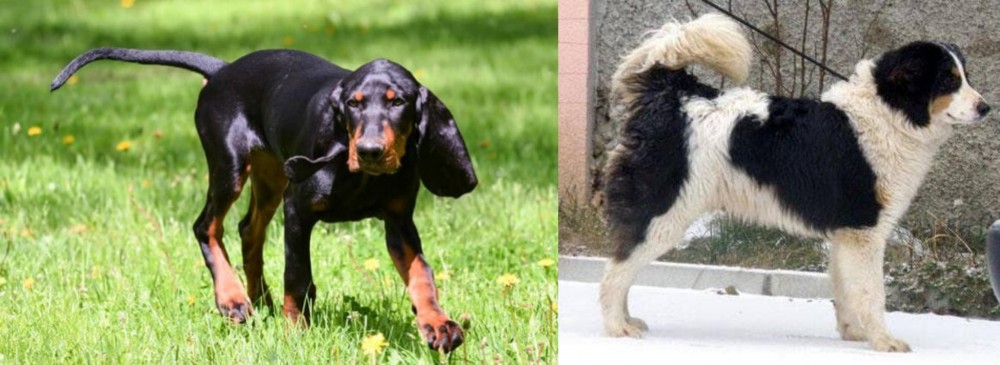 Black and Tan Coonhound is originated from United States but Tornjak is originated from Croatia. Both Black and Tan Coonhound and Tornjak are having almost same height. Black and Tan Coonhound may weigh 16 kg / 35 pounds lesser than Tornjak. Both Black and Tan Coonhound and Tornjak has same life span. Black and Tan Coonhound may have more litter size than Tornjak. Both Black and Tan Coonhound and Tornjak requires Moderate Maintenance.
Black and Tan Coonhound is originated from United States but Tornjak is originated from Croatia. Both Black and Tan Coonhound and Tornjak are having almost same height. Black and Tan Coonhound may weigh 16 kg / 35 pounds lesser than Tornjak. Both Black and Tan Coonhound and Tornjak has same life span. Black and Tan Coonhound may have more litter size than Tornjak. Both Black and Tan Coonhound and Tornjak requires Moderate Maintenance.
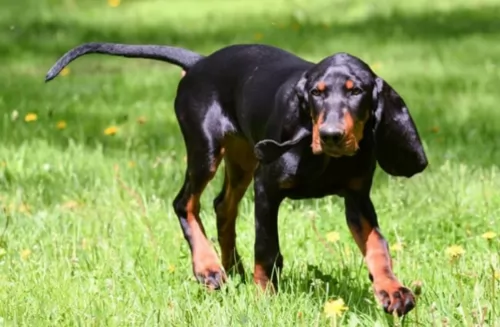 Descendent of the English Talbot Hound, the Black and Tann Coonhound is nevertheless an American creation. Developed by crossing the Black and Tan Virginia Foxhound with the Bloodhound in the very early years of the American experience. It is said that George Washington owned several. The very first Coonhound that was given American Kennel Club registration was the Black and Tan in 1945. They had been admitted to the United Kennel Club in 1912. The Black and Tan Coonhound is a traditional hunting dog – known by hunters as a “trail and tree hound”. This is a dog that finds its prey and trees it. They have incredibly strong instincts to hunt and need to hunt. They can track their prey for miles and if they have a scent you cannot get their attention back. They have been valued because they can “cold track”, following the scent of an animal that left the scene long ago. They are known to have tracked mountain lions and bears as well as deer and coon. They were developed to keep the American settlers safe and well fed, but also to keep them company on the trails or by the fireplace. They are the American Dog.
Descendent of the English Talbot Hound, the Black and Tann Coonhound is nevertheless an American creation. Developed by crossing the Black and Tan Virginia Foxhound with the Bloodhound in the very early years of the American experience. It is said that George Washington owned several. The very first Coonhound that was given American Kennel Club registration was the Black and Tan in 1945. They had been admitted to the United Kennel Club in 1912. The Black and Tan Coonhound is a traditional hunting dog – known by hunters as a “trail and tree hound”. This is a dog that finds its prey and trees it. They have incredibly strong instincts to hunt and need to hunt. They can track their prey for miles and if they have a scent you cannot get their attention back. They have been valued because they can “cold track”, following the scent of an animal that left the scene long ago. They are known to have tracked mountain lions and bears as well as deer and coon. They were developed to keep the American settlers safe and well fed, but also to keep them company on the trails or by the fireplace. They are the American Dog.
 Known also as the Bosnian and Herzegovinian, the Tornjak dog hails from Croatia and Bosnia and is a large mountain sheepdog.
Known also as the Bosnian and Herzegovinian, the Tornjak dog hails from Croatia and Bosnia and is a large mountain sheepdog.
It is thought that this protector of livestock dog has been bred from the Tibetan Mastiff. He is an ancient breed because there are records of its existence coming as far back as the 11th century.
As a working dog, his role of guarding sheep became less and the dog’s numbers diminished. It was during the 1970s that the breed was revived.
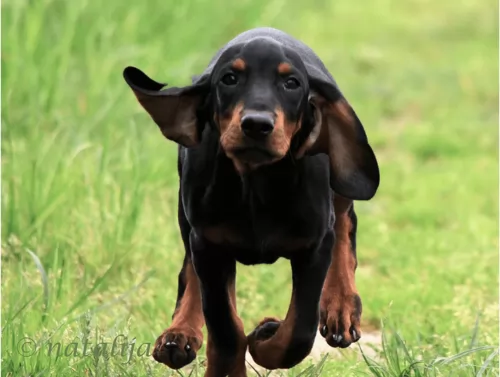 The Black and Tan Coonhound looks like we all imagine a coonhound would look. They have strong and muscular legs, an oval skull and a scissors bite. They have brown or hazel eyes that are very expressive. The ears of course are long like the bloodhound, far back on the head and thin. His nose is amazingly sensitive as he is scent hound. His nostrils are always black. He is a large, strong dog.
The Black and Tan Coonhound looks like we all imagine a coonhound would look. They have strong and muscular legs, an oval skull and a scissors bite. They have brown or hazel eyes that are very expressive. The ears of course are long like the bloodhound, far back on the head and thin. His nose is amazingly sensitive as he is scent hound. His nostrils are always black. He is a large, strong dog.
 This is a large, strong dog, standing at between 58 and 72cm in height and weighing between 28 and 50kg. He has a long, thick coat which has always protected him from the harsh winters of the countries he comes from.
This is a large, strong dog, standing at between 58 and 72cm in height and weighing between 28 and 50kg. He has a long, thick coat which has always protected him from the harsh winters of the countries he comes from.
Common colors for the coat are mainly white with tan, brown, grey or black markings.
The Tornjak is a beautiful dog and also calm by nature, well balanced, intelligent and self- confident. His calm nature doesn’t stop him from being a good watchdog though as he is also alert and brave.
He is more than willing to please his owner and is able to be trained and socialized with ease.
He is a social dog and just loves spending time with hs human family. Therefore efforts should be made not to leave him alone for long periods of time. He forms strong bonds with them and is loving and devoted. Because of his size and energy he won’t suit life in the city on a small property but will be better suited to life in the countryside.
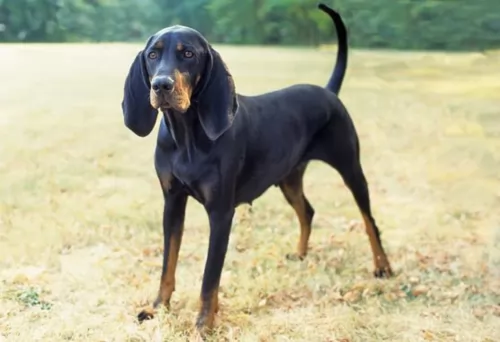 The Black and Tan Coonhound is intelligent, calm, affectionate, independent, strong, and stubborn. They love children and are gentle with them, but they are also very independent and may not do what the child wants them to do in play. They are loyal to their family and will bay at strangers. They are incredibly adaptable and happy-go-lucky. They will end up on the couch or bed so don’t try to fight it. They like cars and enjoy traveling. If you get a BTC be ready for that booming voice.
The Black and Tan Coonhound is intelligent, calm, affectionate, independent, strong, and stubborn. They love children and are gentle with them, but they are also very independent and may not do what the child wants them to do in play. They are loyal to their family and will bay at strangers. They are incredibly adaptable and happy-go-lucky. They will end up on the couch or bed so don’t try to fight it. They like cars and enjoy traveling. If you get a BTC be ready for that booming voice.
 With their human family, they become attached and loyal, not wanting to be separated from anyone for too long. Give him the care this beautiful dog deserves and he'll make you a splendid pet and companion.
With their human family, they become attached and loyal, not wanting to be separated from anyone for too long. Give him the care this beautiful dog deserves and he'll make you a splendid pet and companion.
 Most dogs face one or two health challenges in their lives, but most Tornjaks are healthy and won’t easily get sick.
Most dogs face one or two health challenges in their lives, but most Tornjaks are healthy and won’t easily get sick.
They’re large dogs so they typically don’t live as long as small dogs. They can live to be between 10 and 12 years of age.
This is a dislocation of the kneecap, caused by an injury or it can be present at birth. It can cause pain and a limp.
This is a joint condition that is more often seen in large dogs. The ill-fitting joint rubs and chafes, and osteoarthritis and more pain is the result.
You will have to speak to your vet about relieving the pain for your dog and making him more comfortable. Don’t think hip dysplasia is something only old dogs get – it can develop with young dogs – even puppies. Your veterinarian will examine your pet and suggest different medical and surgical options.
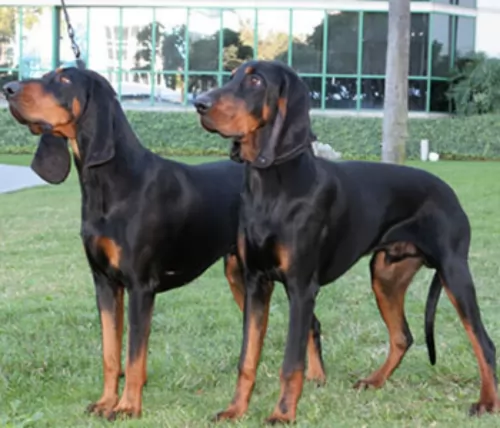 This coonhound is a big, rugged, working dog and needs to be fed accordingly. Feed him at least twice a day in smaller portions and not right before or right after exercise. Don’t send him on a hunt with a full stomach. Don’t overfeed.
This coonhound is a big, rugged, working dog and needs to be fed accordingly. Feed him at least twice a day in smaller portions and not right before or right after exercise. Don’t send him on a hunt with a full stomach. Don’t overfeed.
Not that the Black and Tan Coonhound is lazy, but he can be a couch potato when he is not working. He needs moderate exercise everyday and he does well at activities like barn hunt and field games. If he does catch a scent outdoors and he is not confined in a fence, he will follow the scent with no attention to your calls at all. He can run for miles on end when pursuing prey, but he’d also enjoy just jogging along side you or your bike. He loves long walks but make sure he is on a leash and can’t follow his nose.
 The Tornjak needs exercise every day to keep him fit and happy. He will love it when you take down his leash for his daily walk. He is a social dog and will want to be involved with all your activities. He gets on well with other dogs too.
The Tornjak needs exercise every day to keep him fit and happy. He will love it when you take down his leash for his daily walk. He is a social dog and will want to be involved with all your activities. He gets on well with other dogs too.
The Tornjak will require quite a bit of grooming because the hair is fairly long and it sheds. Some dog owners have the hair cut by a professional groomer. Regular brushing certainly helps to reduce lots of dog hair flying around.
The insides of his ears need to be checked for signs of redness as well as the eyes. The eyes should be checked for pus and redness. Occasional dog nail trimming will also be required.
Provide your Tornjak with top quality food. If you feed him with one of the commercially manufactured foods, make sure it is one of the better brands. The inferior brands are filled with bad ingredients that can actually make a dog sick.
Try to include some home-made food which can be added to the dry kibble twice a week as a treat. Avoid human foods such as chocolates, grapes, onions, peanuts and chips as these can give him stomach pain and more vet bills for you.
Stick to wholesome, simple foods such as boiled chicken, brown rice or pasta and spinach, sweet potatoes and carrots. Your Tornjak will love it and it will ensure he has bright eyes ad a wagging tail. Never leave him without a constant supply of fresh, cool water.